
(via Brandon)
Come here for all of Steven Padnick's deep, deep insights into comics, superheroes, publishing, and everything in between.
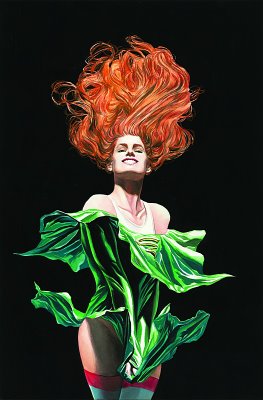
No reason for Solomon Grundy to get a peak at your secret garden.
(by the way, three makes it a conspiracy, so I have a new tag)
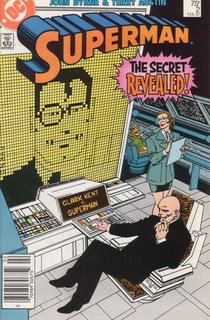 Second hardest character in fiction to write? A protagonist that's smarter than the you are. If someone is a certifiable genius, if, in fact, her super power is being a genius, then how are you ever going to come up with something so clever and wise that it earns the distinction of intelligence beyond the merely human.
Second hardest character in fiction to write? A protagonist that's smarter than the you are. If someone is a certifiable genius, if, in fact, her super power is being a genius, then how are you ever going to come up with something so clever and wise that it earns the distinction of intelligence beyond the merely human. 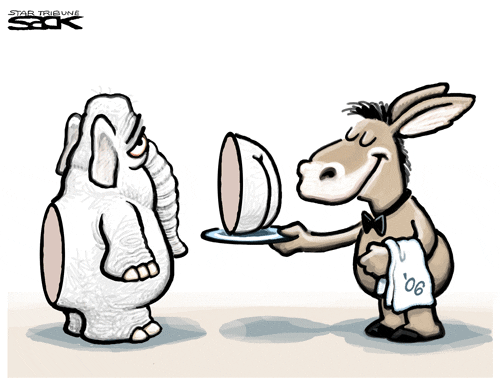
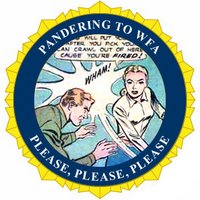 On Tuesday, I posted about how happy I was that two of my favorite characters, who have never met despite having linked origin stories, were going to fight for the first time, written by one of my favorite writers. And I got linked to by When Fangirls Attack.
On Tuesday, I posted about how happy I was that two of my favorite characters, who have never met despite having linked origin stories, were going to fight for the first time, written by one of my favorite writers. And I got linked to by When Fangirls Attack. Captain Atom is a tool. Whenever writers need an asshole superhero, they get Captain Atom. He’s constantly trying to beat up other heroes on behalf of the federal government.And that's basically it. His defining feature is that he's as powerful as Superman, but he obeys the authorities, and it's always the wrong choice to make. And since Captain Atom is also portrayed as honest and sincere, he comes across as insanely naive, if not a little mentally handicapped.
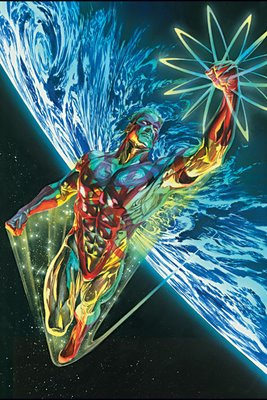
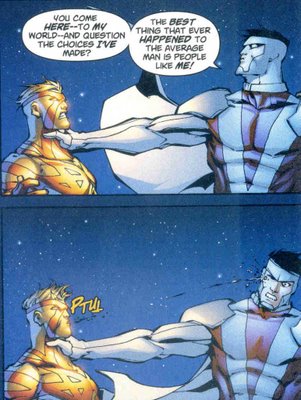 Captain Atom: Armageddon is probably the best inter-company crossover I've ever read (which I know isn't saying much but...) because it actually contrasts the characters that meet, rather than the usual misunderstanding, fight and team-up model. The Wildstorm characters see the establishment asshole that Captain Atom is usually portrayed as. But from Captain Atom's point of view, he's trapped in a world ruled by amoral, hyper-violent superheroes who have terrified the populace into submission. There's no misunderstanding, they understand each other perfectly. That's why they fight.
Captain Atom: Armageddon is probably the best inter-company crossover I've ever read (which I know isn't saying much but...) because it actually contrasts the characters that meet, rather than the usual misunderstanding, fight and team-up model. The Wildstorm characters see the establishment asshole that Captain Atom is usually portrayed as. But from Captain Atom's point of view, he's trapped in a world ruled by amoral, hyper-violent superheroes who have terrified the populace into submission. There's no misunderstanding, they understand each other perfectly. That's why they fight.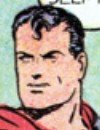
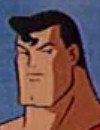
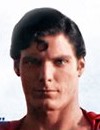
 But of course, the comic of the week, my HANDS DOWN pick, is Seven Soldiers of Victory #1. And it had THREE great last pages. Sure it could have ended on page 37. With its narration directed at the reader and image and panels that recall the first page of the first issue of Seven Soldiers, it would have been a nice bookend. Or it could have ended with page 38, the twist ending. But like Nextwave before it, Seven Soldiers had a moment, an image so powerful that it FORCED itself to the last page. The moment certainly isn't the end of the story. It's not even a very important moment to the main plot.
But of course, the comic of the week, my HANDS DOWN pick, is Seven Soldiers of Victory #1. And it had THREE great last pages. Sure it could have ended on page 37. With its narration directed at the reader and image and panels that recall the first page of the first issue of Seven Soldiers, it would have been a nice bookend. Or it could have ended with page 38, the twist ending. But like Nextwave before it, Seven Soldiers had a moment, an image so powerful that it FORCED itself to the last page. The moment certainly isn't the end of the story. It's not even a very important moment to the main plot.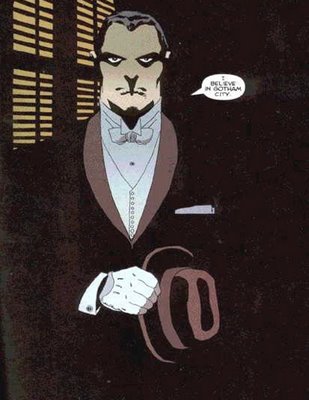 Batman isn't just "the man," Bruce Wayne is also The Man. He's a rich, white, handsome man who comes from an old money family and is the main employer in Gotham. He owns half the property in the city. In a very real sense, Gotham belongs to him, and he inherited all of it.
Batman isn't just "the man," Bruce Wayne is also The Man. He's a rich, white, handsome man who comes from an old money family and is the main employer in Gotham. He owns half the property in the city. In a very real sense, Gotham belongs to him, and he inherited all of it. Consider the Penguin. He's a criminal, a thug. But what really distinguishes him is his pretensions to being upper class. The tux, the monocle. The fine wine and fine women. Running for mayor. He tries to insinuate himself with actual socialites, some of whom are attracted to his air of danger, but most of whom are repulsed by his "classless" manners. And when his envy and resentment of his "betters" turns to violence, Bruce steps in to teach him his place.
Consider the Penguin. He's a criminal, a thug. But what really distinguishes him is his pretensions to being upper class. The tux, the monocle. The fine wine and fine women. Running for mayor. He tries to insinuate himself with actual socialites, some of whom are attracted to his air of danger, but most of whom are repulsed by his "classless" manners. And when his envy and resentment of his "betters" turns to violence, Bruce steps in to teach him his place.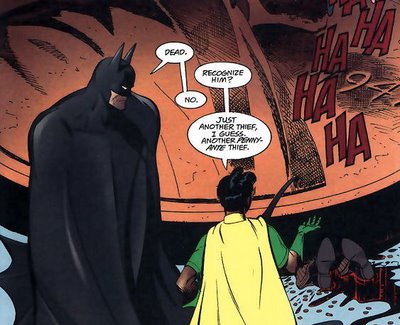
 Many a man fails as an original thinker
Many a man fails as an original thinkerInfinite Crisis was the moment where DC kind of threw everything up in the air and said, "Okay, guys, pull it all back together again. You can pick bits from anywhere – from the comics, the movies, the cartoons, whatever – and polish it all up and make it go."(emphasis mine)
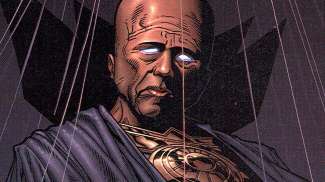
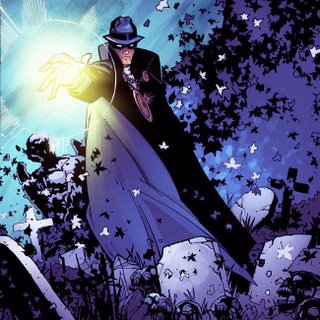


Spider-Man
The Thing
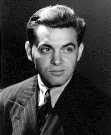



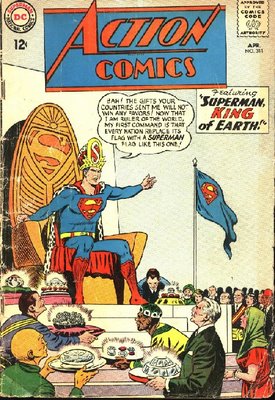 Once again, what started as a response to Matthew has grown into an entire blog post (including a little anti-Bush rhetoric and, to my surprise, praise for Infinite Crisis). In response to my last post that Superman was in fact a working class hero and his stories are anti-classist, he wrote
Once again, what started as a response to Matthew has grown into an entire blog post (including a little anti-Bush rhetoric and, to my surprise, praise for Infinite Crisis). In response to my last post that Superman was in fact a working class hero and his stories are anti-classist, he wroteEverything you say about Superman is true. But you're talking about what Superman does, and what he thinks and believes and stuff. What I was talking about is who he technically is, and who he is is, basically, the Lost Prince of Krypton. He's like Carrot in the Discworld books.I meant to respond right away, but I couldn't tell whether our disagreement over the class of Superman was a minor semantic disagreement over the definition of the word "is" (which would be too minor to even argue) or a major philosophical one over the meaning of social class and the nature of hereditary predestination. I'm going to assume it's the second, even though there is no way to do that justice in one post of my comics blog.
This way, the Superman writers get to have it both ways. They can draw from the alien-aristocrat superhero archetype, but they don't have to make him act like it. (Contrast: Superman, and Dr. Tachyon from the Wild Cards novels.) This may actually be one reason (out of all the many reasons) why Superman is such a great character.
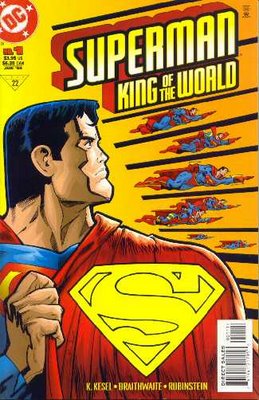 My problem with basing Superman's class on his genetics over his actions is that class is a social construct. It is only through what he and others consider him to be that we know what class he belongs to. And Superman chooses NOT to be a king (stories where Superman chooses to become a king will be ignored because they are terrible) The myth of aristocracy is that class is genetic, that some people are just born good enough to rule, and that this inherent goodness can be passed down from generation to generation (like the X-Gene!)
My problem with basing Superman's class on his genetics over his actions is that class is a social construct. It is only through what he and others consider him to be that we know what class he belongs to. And Superman chooses NOT to be a king (stories where Superman chooses to become a king will be ignored because they are terrible) The myth of aristocracy is that class is genetic, that some people are just born good enough to rule, and that this inherent goodness can be passed down from generation to generation (like the X-Gene!)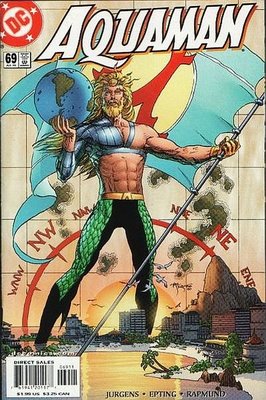 This is unlike almost every other superhero, by the way. Contrast Superman with Aquaman, for example. Like Superman, he was orphaned as a baby, raised in an alien world, and grew up as a human for at least part of his life (where he learned English and was christened Arthur Curry). But when Aquaman learned where he was really from, he rejected the surface world and threw in his loyalties to Atlantis whole-heartedly, in the more traditional Arthurian arch-type. (Ironically, to become King Arthur, he had to reject the name "Arthur.") Even given the chance, Superman would NEVER give up Earth to return to Krypton.
This is unlike almost every other superhero, by the way. Contrast Superman with Aquaman, for example. Like Superman, he was orphaned as a baby, raised in an alien world, and grew up as a human for at least part of his life (where he learned English and was christened Arthur Curry). But when Aquaman learned where he was really from, he rejected the surface world and threw in his loyalties to Atlantis whole-heartedly, in the more traditional Arthurian arch-type. (Ironically, to become King Arthur, he had to reject the name "Arthur.") Even given the chance, Superman would NEVER give up Earth to return to Krypton. Matthew brings up Carrot Ironfoundersson of the Discworld novels, another heroic king-in-disguise who refuses to take the throne. But that, I think, argues for MY point. Discworld, after all, is a satire of the myth of aristocracy (among many other things). Most of the other characters think Carrot should rule because of his unacknowledged heritage, but those that think that way are idiots and bad guys.
Matthew brings up Carrot Ironfoundersson of the Discworld novels, another heroic king-in-disguise who refuses to take the throne. But that, I think, argues for MY point. Discworld, after all, is a satire of the myth of aristocracy (among many other things). Most of the other characters think Carrot should rule because of his unacknowledged heritage, but those that think that way are idiots and bad guys.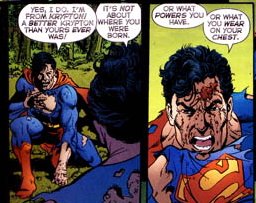
And, after laying Prime out, Clark lets him know what it's all about:
 Matthew at the Legion Abstract has a great post about class and superheroes that you need to read right now and then come back here. This started as a response but it became very long and I remembered I have my OWN blog. (post on Detective 823 continues to be delayed).
Matthew at the Legion Abstract has a great post about class and superheroes that you need to read right now and then come back here. This started as a response but it became very long and I remembered I have my OWN blog. (post on Detective 823 continues to be delayed). And while Matthew's right, it would be morally repugnant for Superman to enforce social change, Clark Kent can and does champion those changes from his job as a reporter for the Daily Planet.
And while Matthew's right, it would be morally repugnant for Superman to enforce social change, Clark Kent can and does champion those changes from his job as a reporter for the Daily Planet.